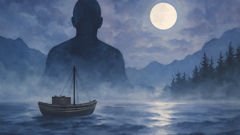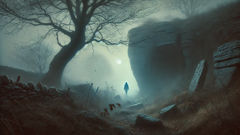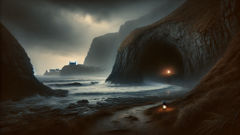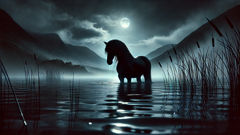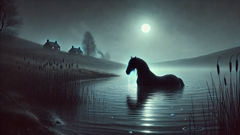Introduction
The Seto Inland Sea stretches like a polished jade mirror between the mist-veiled mountains of Honshu and Shikoku. It’s a place where time slows to the rhythm of the tides, and where the wind carries the scent of salt and pine through the narrow straits between fishing villages. On certain nights, the sea is so calm that it seems to hold its breath, reflecting the moon in a perfect silver arc. Yet, for all its beauty, these waters have always been whispered to hold secrets—some old as the islands themselves. Among fishermen, there is a legend passed from father to son: a story that rides the foam and clings to the rocking hulls of wooden boats. They speak of the Umibozu—a vast, dark spirit rising from the stillness, its featureless head towering above the mast, arms like columns of living fog, and eyes unseen but felt in the trembling of the heart. It is said that the Umibozu comes only when the sea is so quiet you can hear your own fears. It waits, patient and immense, for the careless word, the spoken challenge, the foolish question. To speak to the Umibozu is to invite disaster; ships splinter, men vanish, and the ocean swallows every trace. This story is not just a warning. It’s the tale of a family who called the Seto their home, of a boy named Ren who dared to seek his own answer, and of the night when silence became his only shield against the shadows moving beneath the waves.
I. Whispers on the Wind
Ren had always loved the sea, even when it frightened him. His village, Takashima, perched on a narrow finger of land jutting into the Seto Inland Sea, lived and died by the whims of the water. It was a place of weathered docks, salt-crusted ropes, and the ceaseless creak of boats at anchor. Ren’s family—his father Haruto, his mother Kiyo, and his elder brother Jiro—were fishermen like their ancestors. Every morning before dawn, they pushed their boat through the low tide and vanished into the gray haze that settled between the islands. Ren, though only fourteen, had already learned to read the moods of the sea: the way the color changed before a storm, the taste of coming rain in the air, the sharp scent of seaweed signaling a hidden shoal. But there was one lesson he could never forget, told in the hush of night when lanterns burned low and the wind rattled paper walls. 'Never speak when the sea goes silent,' his father warned. 'If you see something that does not belong—something larger than any man or whale—keep your head down, your lips closed, and your prayers inside.'
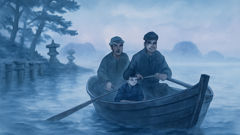
The legend of the Umibozu had haunted Ren’s childhood. Some said it was the angry spirit of a drowned monk, others that it was the sea’s own sorrow given shape. The elders recounted stories of ships found adrift with no one aboard, of nets torn to ribbons, of sudden storms that left no survivors. Yet for all the stories, no one could say what the Umibozu wanted—only that it hated being spoken to. Ren’s brother Jiro scoffed at such tales. 'Ghost stories for cowards,' he’d mutter, but even he would check the knots twice when the fog rolled in thick and soundless. That spring, the sea turned stingy. The nets came up empty, day after day. Neighbors grumbled of ill omens. With each failure, Haruto grew more tense; every coin mattered, and Ren saw the lines in his father’s face deepen. The village needed a festival’s catch, but the fish had vanished like spirits at sunrise. It was during this uneasy time that Ren’s curiosity grew. He began to ask questions—quietly at first, then with more urgency. Why would a spirit haunt fishermen? What did silence have to do with survival? On a windless night, as his family sat around a bowl of thin soup, Ren finally dared to voice what he’d wondered for years. 'What if the Umibozu is just the sea itself, angry because we’ve stopped respecting it?' Kiyo hushed him, eyes darting to the shuttered windows as if the spirit might slip through the cracks. 'Don’t talk about such things, Ren,' she whispered. But the question lingered, heavy as fog, as Ren prepared for his next journey with his father and brother—one that would test every truth he thought he knew about the world beyond the shore.
II. Calm Before the Storm
The next morning, Ren awoke to a sky without wind and a sea so smooth it might have been glass. It was rare for the Seto to be so still; even the gulls seemed hesitant, circling above in restless patterns. Haruto decided they would fish farther out, beyond the usual grounds, chasing rumors of a hidden shoal where fish might still gather. Ren packed the nets and dried rice, his heart tight with worry and anticipation. As the boat slid from the dock, Takashima faded into the mist behind them. The world shrank to wood, water, and sky.
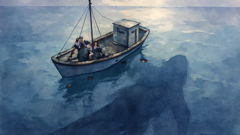
Hours passed. Jiro hummed under his breath, breaking the silence now and then with a joke or complaint. Haruto steered by instinct, eyes narrowed against the pale glare. Ren watched the water, noting the way it seemed to swallow sound; the splash of their oars was quickly lost, as if muffled by invisible hands. They reached the shoal by midday. The nets went overboard, unfurling like dark wings beneath the surface. Ren felt a shiver run up his spine. The silence pressed in, heavier than before. He glanced at his father, who nodded in grim approval. 'Work quickly,' Haruto muttered, voice barely above a breath. The catch was meager—two silver tai and a scattering of sardines—but it was something. They set the nets again, this time closer to a rocky outcrop that jutted from the water like the spine of some ancient beast. The sun sank behind clouds, and the world turned dim. Ren’s mind drifted to stories: fishermen who vanished without a trace; boats found upright but empty; the black shape rising from a mirror-still sea. He forced himself to focus on his hands, tying knots and checking floats.
The third haul brought disaster. The net snagged on something heavy. Jiro leaned over to free it—and nearly fell in as the rope jerked violently. Haruto grabbed his son’s collar, hauling him back just as a swirl of black water frothed near the bow. The sea remained eerily calm. No fish thrashed; no waves broke. Only a single, low vibration seemed to run through the boat, as if some immense creature passed underneath. The air turned cold. Ren stared at the water, heart pounding. There, just beneath the surface, he glimpsed a shadow—vast and formless, its outline shifting like ink in water. He tried to speak, but remembered his father’s warning. All three froze, holding their breath. The boat drifted. The shadow did not follow. Slowly, the chill eased. Haruto motioned for silence, and they rowed away, nets abandoned. Behind them, the water closed, still and unmarked, as if nothing had happened at all. When they reached shore, Ren’s legs nearly buckled. Jiro refused to speak of what he’d seen, but Haruto offered a prayer at the family shrine that night. Kiyo wept in relief. Yet for Ren, fear mixed with fascination. The Umibozu was real—he had seen it. But why had it spared them? The question burned in his mind, refusing to be silenced.
III. The Night of Silence
Life in Takashima changed after that day. Haruto became more cautious, setting out only when he felt the tides were right. Jiro grew sullen, avoiding both sea and supper. Rumors spread quickly in small villages; soon neighbors eyed Ren’s family with a mixture of envy and suspicion, whispering that they had seen something forbidden. The catch improved for others, but not for them. Nets returned empty, and hunger pressed close. Desperation hung over their home like low clouds before a storm.

One night, as summer’s heat turned oppressive, Ren lay awake listening to the restless sea outside. From his futon, he could hear his parents murmuring in the next room. He understood their fear: no fish meant no coin, and autumn would bring cold and want. Unable to sleep, he crept outside. The moon was bright, silvering the waves. He walked the shoreline, searching for answers in the soft rush of water over pebbles. There, at the end of the dock, he found an old man—a fisherman named Saburo, whose back was bent with age and whose eyes shone with memories. Saburo beckoned Ren to sit.
'You saw it, didn’t you?' Saburo’s voice was barely more than a breeze. Ren nodded. The old man stared at the horizon. 'The Umibozu comes for those who forget their place. It listens for pride, for careless talk. But it is not evil—not as we are evil. It’s the sea’s anger given form, and the sea forgives those who show respect.' Ren listened carefully, absorbing every word. Saburo told him of an ancient pact: fishermen could survive as long as they remembered their humility, never boasting or questioning what lay beneath. The Umibozu punished arrogance, but sometimes spared those who kept faith.
The next day, Ren made a decision. He would go out alone, offer a prayer, and try one last time to save his family. He woke before dawn, left a note for his mother, and slipped down to the dock. Mist wrapped the village in a shroud; even the gulls were silent. Ren rowed beyond the shallows, heart thundering in his chest. He let the boat drift. The sea was perfectly still. Ren closed his eyes and whispered a promise: 'I will not boast, and I will not question. Let my hands be humble.' When he opened his eyes, the surface rippled—no wind, no current. A shadow rose from the depths, larger than before. The Umibozu emerged: immense and faceless, its head breaking the surface like a moonless night. Ren felt its gaze, though it had no eyes. He bowed his head, lips pressed tight.
Minutes stretched. The boat rocked gently. The Umibozu hovered above, silent as fate. Then it slowly submerged, leaving only widening rings behind. Ren’s nets trembled; when he hauled them in, they were full—more fish than he’d seen all season. He returned home with enough for the village. His family rejoiced. Haruto embraced him, tears mixing with laughter. Word spread quickly, but Ren never spoke of what he had seen. The legend of the Umibozu lived on, but now it carried a new lesson: respect for what cannot be understood, and humility before the vastness of nature.
Conclusion
The Seto Inland Sea never truly gives up its mysteries, and even now, on certain nights when the water lies motionless beneath a heavy moon, villagers claim they glimpse a vast shadow gliding just below the surface. They remember Ren’s story, though he never boasted nor spoke of his encounter directly. Instead, his legacy became a quiet reverence—a practice of gratitude before each journey, a silent bow to the water’s edge, and a humble respect for the forces beyond human control. The legend of the Umibozu endures not as a tale of terror, but as a living reminder: sometimes, the greatest wisdom is knowing when to speak and when to remain silent; when to challenge the unknown and when to bow to it with respect. In the hush before dawn, as fishermen push their boats into misty waters, they carry more than nets and hope—they carry a memory stitched into every ripple: that humility before nature’s power is not weakness, but survival.

